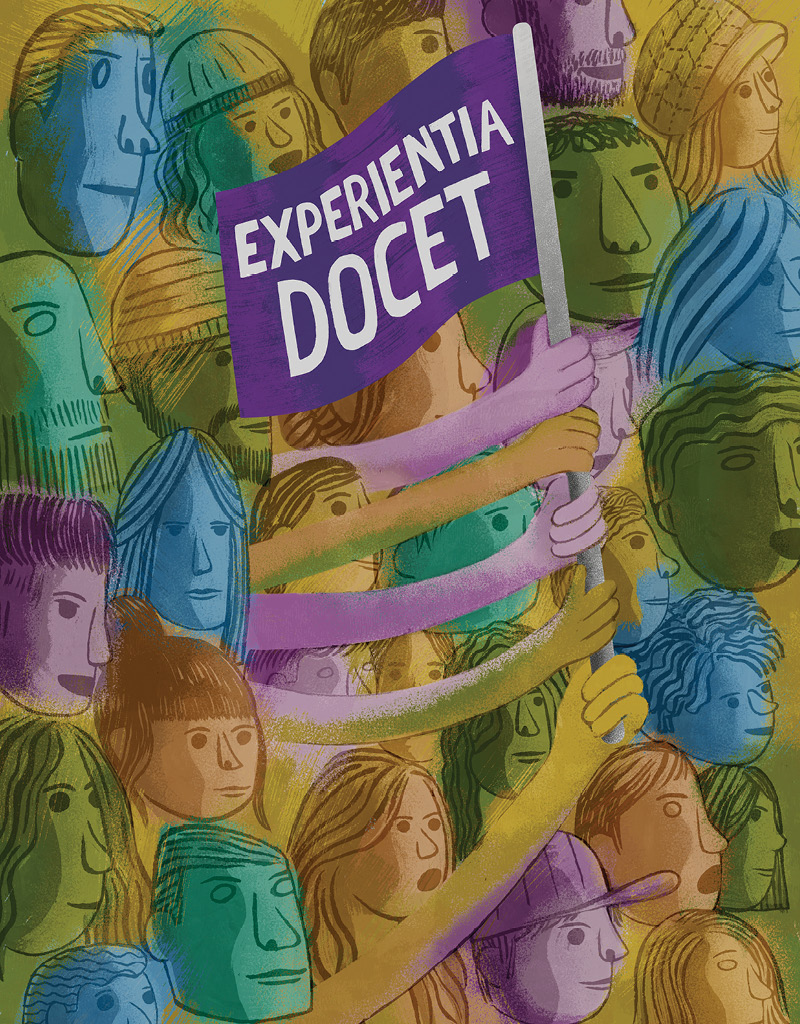
By Tom Kertscher, Lydia Lum and Lisa Owens Viani
Illustration by Santiago Uceda
In very different ways, bold Gators are moving toward the same goal: changing the world for the better
SF State is known for diversity and debate. It ranked seventh for ethnic diversity in U.S. News & World Report’s latest review of national universities, and as for debate … well, just ask alumni and students where they stand on the big issues of the day and you’ll hear a lot of strong opinions. Yet the University stands united under one ideal: its motto, “Experientia Docet.” “Experience teaches.” It’s a philosophy that emphasizes doing as the key to learning. Combine that with SF State’s historical commitment to social justice and it should come as no surprise that graduates leave campus with a deeply ingrained determination to turn their ideals into deeds. Around the world, Gators are making a difference. Their backgrounds and methods may be different, yet they’re all doing the same thing: taking action to help.
Micro-Donations, Big Results
According to the Stanford Center on Poverty and Inequality, black Americans are imprisoned at five times the rate of whites, and one in every 10 black children has an incarcerated parent. And often being behind bars isn’t a matter of a guilty verdict: It’s because the accused can’t afford to make bail, impacting their families, their communities (which pick up the tab for lengthy confinements) and their ability to defend themselves.
To Kortney Ziegler (M.A., ’05), these aren’t just disturbing statistics. They hit home. “The majority of black Americans are intimately connected to mass incarceration, whether it’s personally being affected by it or someone in our immediate family,” says Ziegler, an African American whose mother is currently incarcerated.
In 2017, when the group National Bail Out was fundraising for cash-strapped prisoners, Ziegler was inspired to create an app that addresses the issue through crowdfunding. The result was Appolition, which uses donors’ spare change to change lives. When you link your debit card with the app, your purchases are rounded up to the nearest dollar, and those extra cents go to nonprofit groups that help prisoners facing misdemeanor charges make bail.
All that small change is adding up to big results: As of January, Appolition’s 2,000 users had donated $250,000, getting more than 50 people out of jail and back with their families.
A Dream of Justice Comes True
Until recently, Denia Perez (B.A., ’12) was so busy fighting for the chance to practice law in Connecticut she didn’t bother making Plan B. She stayed focused on the challenge at hand: State law banned her from membership in the bar because she was a “Dreamer” brought into the U.S. from Mexico as an infant without documentation.
“So much of my life has been uncertain that it’s distracting to think of potential difficulties beyond what’s in front of me,” says Perez, who estimates that her parents spent half her childhood fighting deportation.
A women and gender studies major at SF State, Perez won a full scholarship to Connecticut’s Quinnipiac University School of Law. Yet she couldn’t use the degree she earned there because of the statute limiting bar membership to U.S. citizens and permanent residents. So Perez and her allies campaigned for a change to the law — and got it. Last year, she became the first Dreamer to be admitted to the Connecticut Bar Association.
Perez isn’t done crusading, though: She’s currently using her legal skills on behalf of a nonprofit that specializes in deportation defense.
Police Beat
After Oscar Grant was killed by a BART police officer at Oakland’s Fruitvale station, hip-hop artist Jinho Ferreira (B.A., ’06) was heartbroken and angry, yet decided on a surprising response: join the police.
“I didn’t know how far I was going to get, but I had to take some kind of action, something that mattered immediately,” says Ferreira.
A member of the alternative hip-hop band Flipsyde, Ferreira had toured with artists like Snoop Dogg and the Game. He’d also won the Creative Promise Award for screenwriters at the Tribeca Film Festival. So law enforcement was a big switch. He was more than up for the challenge, though: Ferreira graduated near the top of his class and became an Alameda County deputy sheriff in 2011. He sees his job as less about enforcing laws than building bridges.
“If you’re one of those cops who are concerned with the way black and poor people are treated and you want to change it, you can,” he says.
From Campus to a Refugee Camp
SF State’s can-do attitude isn’t just reflected in its graduates. Cecelia Wambach has been a mathematics education professor at the University since 1984, developing pioneering programs for urban schools. Though she retired in 2005, she’s not done making a difference. As a professor emerita of mathematics education, she’s remained a champion of innovative teaching in California. After seeing
a TV report on Europe’s refugee crisis,
she started to wonder if she could help there, too.
“All those children with nothing to do, living in the squalor of the refugee camp — I couldn’t bear the thought,” Wambach recalls.
Wambach travelled to the Greek island of Lesvos, home to one of Europe’s biggest refugee camps. It was obvious to Wambach that the children there needed not just food and shelter but education. So in 2016 she founded what is now called Refugee Education and Learning International, which brings volunteer teachers to the island. Hundreds of refugee children have been served.
“I believe that we are in this world to be a part of the healing of the world,” Wambach says. “I am so privileged to have the opportunity to do just that.”